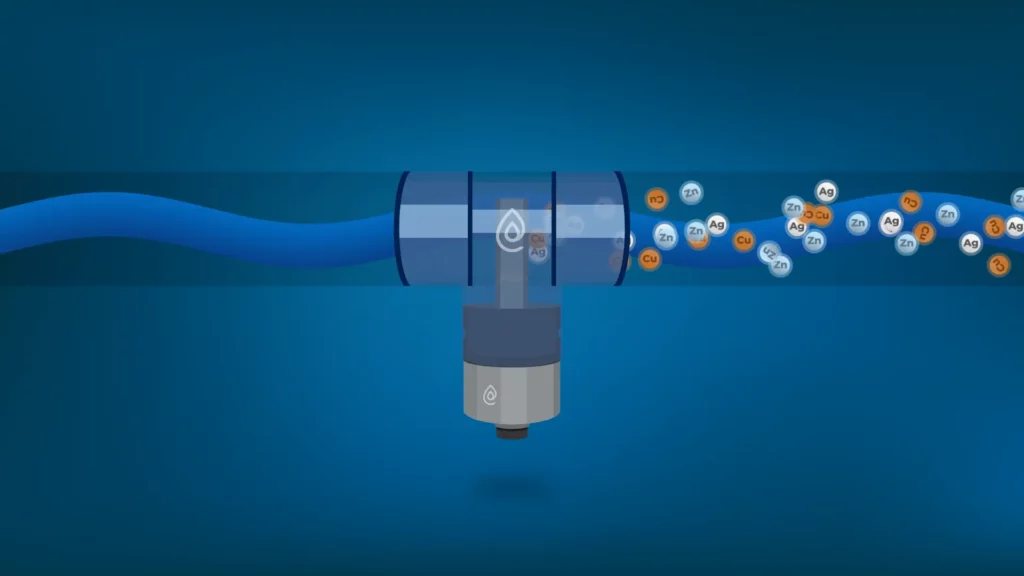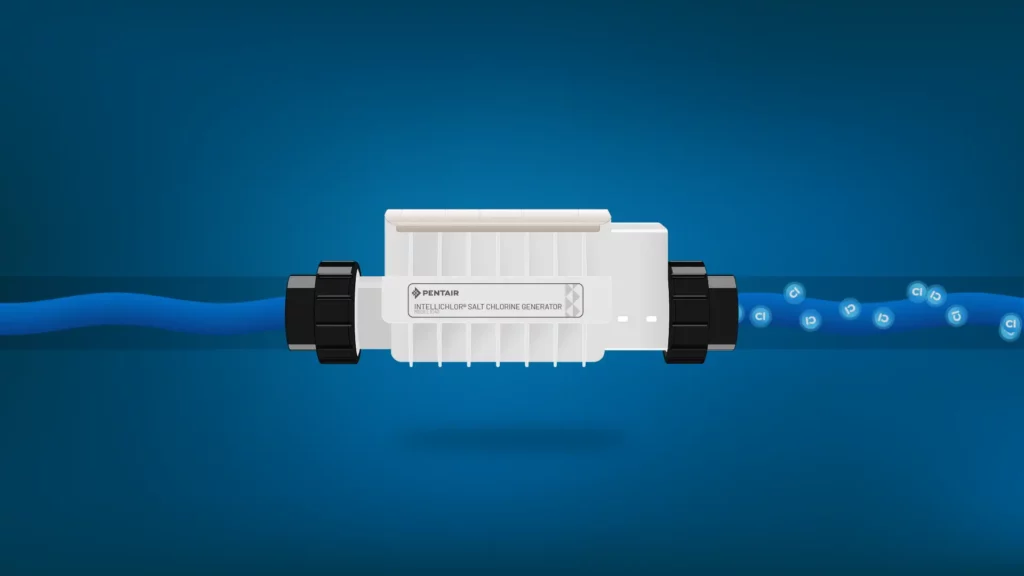Pool Ionizer vs. Salt Chlorinator
Choosing the right pool sanitation system is essential for maintaining water quality while ensuring a safe and enjoyable swimming experience. Two popular alternatives to traditional chlorine treatment are pool ionizer and salt chlorinator. While both systems reduce reliance on standard chlorine, they operate using distinct mechanisms. Understanding their differences can help pool owners determine the best option for their needs.
How Pool Ionizers Work – Ion Generation
Pool ionizers release mineral ions into the water by applying a weak electrical current to a set of electrodes plumbed into the pool filtration system.

Mineral Ions in Action – Copper ions prevent algae growth, while silver ions target bacteria and other microorganisms, naturally sanitizing the water. Zinc can also be used as an additional algaecide and water clarifier.
Water Treatment – These mineral ions remain active in the water, continuously combating contaminants and reducing the need for chlorine. They are stable in sunlight and do not off-gas.
Continuous Purification – The system maintains a steady mineral ion concentration, ensuring long-term water clarity and sanitation with minimal chemical use.
How Salt Chlorinators Work – Electrolysis Process
A salt chlorinator converts dissolved salt in the pool water into chlorine using an electrolytic cell.

Chlorine Generation – The system produces chlorine gas, which dissolves in the water to sanitize it. Sodium hydroxide, a toxic and corrosive substance, is a byproduct. The sodium hydroxide is what drives up the water’s pH.
Water Circulation – The chlorine continuously disinfects the pool, oxidizing bacteria and organic matter before reverting back to salt.
Automatic Chlorine Production – The process repeats, eliminating the need to add chlorine manually.
Comparing Pool Ionizers and Salt Chlorinators
| Feature | Pool Ionizer | Salt Chlorinator |
| Chemical Use | Reduces chlorine by up to 80% | Reduces need for chlorine tablets but still produces chlorine |
| Water Feel | Soft, mineral-rich water | Softer than traditional chlorine pools but contains sodium hydroxide |
| Sanitization Method | Copper, silver and zinc ions prevent bacteria and algae growth | Copper, silver, and zinc ions prevent bacteria and algae growth |
| Odor | No strong chlorine smell | Reduced chlorine odor compared to traditional pools |
| Skin & Eye Irritation | Gentle on skin and eyes because of low chlorine and no sodium hydroxide | Less irritation than traditional chlorine and but may still cause sensitivity |
| Maintenance | Requires occasional ion level testing and electrode replacement | Requires salt cell cleaning, occasional salt level adjustments, and salt cell replacement |
| Longevity | Electrodes typically last 6-12 months | Salt cells need replacement every 3-5 years |
| Environmental Impact | Eco-friendly with minimal chemical discharge | Reduces chemical use but still relies on chlorine |
| Cost | $300 – $1,000 for a brand-name inline system | $1,000 – $3,000 for a brand-name system |
Benefits of Pool Ionizers
- Lower Chlorine Dependency – Uses natural minerals to maintain water clarity and sanitation.
- Healthier Swimming Experience – Gentle on skin, hair, and eyes with no harsh chlorine effects.
- Eco-Friendly – Reduces chemical discharge, making it a sustainable pool treatment option.
- Lower Maintenance Costs – Requires fewer chemical adjustments and reduces the need for frequent chlorine additions.
- Prolonged Pool Equipment Lifespan – Minimizes corrosion caused by chlorine, salt, and sodium hydroxide, helping extend the life of pumps, filters, and pool surfaces.
Benefits of Salt Chlorinators
- Consistent Chlorine Levels – Automatically generates chlorine, maintaining stable water sanitation.
- Eliminates the Need for Chlorine Tablets – Reduces the cost and effort of manually adding chlorine.
- Softer Water Feel – Provides a more comfortable swimming experience compared to traditional chlorine pools.
- Effective Sanitization – Continually oxidizes bacteria and organic matter, keeping water clean and clear.
- Lower Maintenance than Traditional Chlorine Pools – Requires periodic salt cell cleaning and replacement but eliminates the need for frequent chlorine dosing.
Choosing Between a Pool Ionizer and a Salt Chlorinator
Selecting the right system depends on individual preferences and pool maintenance goals:
- If you prefer a low-chlorine, natural sanitation method with minimal chemical use, a pool ionizer is a great choice.
- If you want an automated system that continuously produces chlorine without the need for tablets, a salt chlorinator may be more suitable.
- For those seeking a hybrid approach, combining a pool ionizer with a low-output salt chlorinator can provide optimal water quality with reduced chlorine levels.
FAQs About Pool Ionizers and Salt Chlorinators
Q1: Can a pool ionizer completely replace chlorine?
A: While pool ionizers significantly reduce chlorine use, a small amount of chlorine or an oxidizer is still recommended to manage organic contaminants.
Q2: Do salt chlorinators eliminate the need for pool chemicals?
A: No, salt chlorinators still produce chlorine, and pool owners need to balance pH and alkalinity levels. pH levels are adjusted more frequently because of the sodium hydroxide byproduct of salt electrolysis.
Q3: Which system is better for sensitive skin?
A: Pool ionizers are generally gentler on the skin and eyes since they minimize chlorine and sodium hydroxide exposure.
Q4: Can a pool ionizer and salt chlorinator be used together?
A: Yes, using both systems can further reduce chlorine levels while ensuring thorough sanitation and less corrosive water.
Q5: Which system has lower maintenance costs?
A: Pool ionizers generally have lower maintenance costs since they require fewer chemical adjustments and reduce chlorine-related wear on pool equipment. Pool ionizer systems are less expensive than salt chlorinators.
More Pool Science Topics:
- How Pool Ionizers Work
- Pool Ionizers for Ponds
- Pool Ionizers for Home Pools
- Pool Ionizers for Hotels & Resorts
- Pool Ionizer vs. UV Systems
- Pool Ionizer vs. Ozone Systems
Explore these topics to learn how ionization can transform your pool maintenance and improve water quality!


